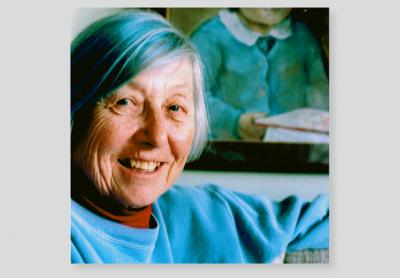Silvia Tennenbaum, Honored Novelist

Silvia Tennenbaum, a novelist, occasional journalist, active member of the East Hampton Democratic Party, and a fixture of The Star’s letters pages who lived in Springs for many years, died on June 27 at Bryn Mawr Hospital in Pennsylvania after a brief illness. She was 88.
Known for the novels “Rachel, the Rabbi’s Wife” and “Yesterday’s Streets” as well as short stories, Ms. Tennenbaum received the Goethe Medal of the Hessian Ministry for Science and Art in 2012 after “Yesterday’s Streets” was published in German. At the age of 84, she went on a book tour throughout the country that had been her childhood home.
In a September 1983 “Guestwords” in The Star, Ms. Tennenbaum called for people to recognize their common issues: “Why can’t we see where our common interest lies, identify with those who are in the same boat with us? The Bonacker surely has more in common with the steelworker in Pittsburgh or the black machinist in Detroit than with the members of the Maidstone Club. . . .” Ms. Tennenbaum was born to Erich Pfeiffer-Belli, a journalist, and Charlotte Stern, a member of an old and prosperous Jewish family, in Frankfurt am Main, Germany, in 1928. Her parents eventually separated and her mother married a conductor who became known later as William Steinberg. In 1936, they went Tel Aviv, where Mr. Steinberg helped establish the Palestine Symphony Orchestra, and the young Ms. Tennenbaum was sent to live in Switzerland with an aunt for a year and a half. The family came to America in 1938 after Mr. Steinberg was hired as an assistant to Arturo Toscanini of the NBC Symphony.
She began her American schooling in New Rochelle, N.Y., learning English and assimilating quickly. As a girl, she was a tomboy who not only loved movies but sports, particularly baseball. A fan first of the Brooklyn Dodgers and Ebbets Field, she later loved the New York Mets and became a longtime season ticket holder at Shea Stadium. On the East End years later, she played softball with a Springs women’s team for a year or two and was one of the first women to pick up a bat at the annual Artists and Writers softball game.
Ms. Tennenbaum went to Barnard College, where she studied art history and she adopted a bohemian lifestyle. For a time she was romantically involved with Anton Rosenberg, a young painter and Beat personality who eventually figured in Jack Kerouac’s “The Subterraneans,” and later in her own first novel.
She and Lloyd Tennenbaum, a young rabbi studying philosophy and mathematics at Columbia University, met as students and married in 1951. Rabbi Tennenbaum was called to a congregation in Lynchburg, Va., and their three children were born there. In addition to raising her children and doing her best to fulfill the obligations to her husband’s congregation, Ms. Tennenbaum began writing and painting. In 1958, she got her first break when her short story “The Sound of Crickets” was a finalist in a nationwide contest and was published in “Stories of the Sixties.”
The Tennenbaums came to Long Island after Rabbi Tennenbaum took the pulpit at the Huntington Jewish Center. They shared a strong sense of political and social responsibility, with Rabbi Tennenbaum speaking out against racial discrimination and the Vietnam War and Ms. Tennenbaum attending anti-war demonstrations and rallies in support of integration and Long Island farmworkers.
They first came to the East End in the 1960s to visit her mother and stepfather who had become the principal guest conductor of the New York Philharmonic. They soon became regular summer visitors, and eventually bought a house on Fireplace Road in Springs.
Ms. Tennenbaum’s first novel, “Rachel, the Rabbi’s Wife,” published in 1977, explored the life of a suburban rebbetzin seeking artistic fulfillment and emergence from the shadow of a vain, egotistical husband. It attracted considerable attention and landed on the New York Times bestseller list. By 1980, however, the couple had separated and Ms. Tennenbaum established herself in an old house on Fireplace Road, becoming active in East Hampton civic and political life. As a member of the Democratic Party, she was an election inspector in Springs for many years. She and her husband were divorced in 1982.
Ms. Tennenbaum also shared her viewpoints, which some considered radical, in many letters to The Star. In the 1980s, one of her letters prompted someone to plant a hand-painted sign reading “Communist Headquarters” near her driveway. She kept it for a time in her garage.
As a writer, Ms. Tennenbaum continued to find success, publishing stories in the New American Review and the Massachusetts Review. One of them, “A Lingering Death,” was selected by Joyce Carol Oates for “Best American Short Stories of 1979.” Her second novel, “Yesterday’s Streets,” was based on her family’s experiences in Germany, though it did not achieve the same acclaim as “Rachel, the Rabbi’s Wife.” She eventually began a third novel, based on the life of Moe Berg, a Princeton-educated baseball catcher and wartime secret agent, but never completed it.
Ms. Tennenbaum had an apartment in Manhattan, where she often spent time, visiting museums and galleries and attending baseball games. The walls of her apartment and Springs house were filled with paintings and prints by local artist friends, such as Perle Fine and Ibram Lassaw, and by such greats as Picasso and Gauguin.
In her later years, she traveled extensively, often in the company of the late Mary Mothersill of Sagaponack. She reacquainted herself with Frankfurt, and developed relationships among the artistic and political communities there. In 2014, she moved to the Quadrangle, an independent living facility in Haverford, Pa., where she continued to keep up with world news and the Mets.
Ms. Tennenbaum is survived by her three sons, Jeremy Tennenbaum of Wynnewood, Pa., David Tennenbaum of Chicago, and Raphael Tennenbaum of Brooklyn. She was buried at Green River Cemetery on June 29 with Rabbi Daniel N. Geffen of Temple Adas Israel presiding.
